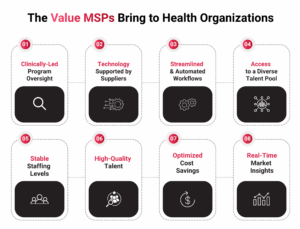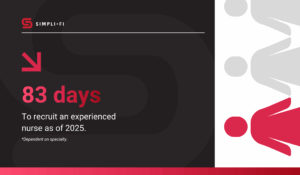Filling a healthcare provider position takes nearly 2 months – 59.5 days to be exact, according to a 2023 LinkedIn analysis. Recruiting an experienced nurse is an even more daunting task, ranging from 62 to 103 days, with an average of 83 days to recruit (depending on specialty, of course). Allied health and CNAs are seeing lengthy times as well, with allied experiencing 40–70 days, and CNAs 30–45.
The result of these lengthy recruitment times and tedious processes often detract leadership from other objectives, hinder clinical teams’ ability to deliver care, and ultimately affect patient care quality.
So, how exactly are hospitals coping with these ever-persisting shortages? One avenue health systems are exploring is simply outsourcing their recruitment processes and workforce management to Managed Services Providers (MSPs). By outsourcing parts or all of the recruitment process, hiring teams can alleviate the time-consuming and arduous process of recruiting and managing qualified clinicians. MSPs will efficiently, cost-effectively, and time-sensitively secure highly skilled talent on your behalf.
Noteworthy about MSPs is their ability to oversee more than just talent acquisition. An ideal provider offers a suite of services, including business intelligence, advanced technology, streamlined workforce operations, rate analysis, vendor relations management, and credentialing, all tailored to your organization’s specific needs.
However, MSP programs are not all created equal. Some follow a cookie-cutter model covering basic staffing needs, while others provide customized, technology-driven solutions to address specific workforce challenges. So, what makes an MSP worthy of your shortlist or RFP? This article examines key factors to consider when selecting the best healthcare MSP for your institution.
Understanding the Role of MSPs in Healthcare
A Managed Services Provider in healthcare is an outsourced, third-party entity that manages your workforce needs, including the recruitment process. Acting as a single point of contact, an MSP handles all vendor relations on your behalf, providing access to a vast pool of skilled professionals, and managing the recruitment cycle from sourcing and onboarding to payroll.
By centralizing workforce processes, the managed services partner streamlines operations and alleviates the administrative burden on hiring leaders and teams. This allows them to focus more on their own core employees and strategic initiatives, rather than burdensome recruitment tasks.
Note that healthcare institutions can benefit from MSPs in several ways, including cost savings, program visibility, reduced compliance risks, optimal staff levels, data-driven decision-making, greater diversity, business intelligence, and increased employee wellbeing.

Key Factors to Consider When Choosing an MSP
1. Current State
Before diving into research mode and shortlisting potential MSPs, first evaluate your current workforce and recruitment processes and envision how your healthcare organization aims to evolve. Identify the major obstacles that could impede these future goals. Assess your current capabilities in handling all aspects of workforce management, managing vendor relationships, tracking metrics, and meeting fill rates.
By examining your strengths and challenges, you can determine if an MSP is the right workforce solution to address your needs and support your workforce strategy’s growth. This evaluation will ensure that any provider you consider can effectively help you overcome current limitations and achieve your future objectives.
2. Healthcare Experience and Expertise
Healthcare recruitment requires a deep understanding of clinical needs, compliance regulations, and industry nuances so try to find a provider with industry-specific experience and knows how to navigate healthcare recruitment. A more general MSP may lack the knowledge and experience necessary to recruit the right professionals and may ultimately detract from efficient recruitment.
Verify certifications and qualifications of the MSP team, along with their compliance systems and technology. Additionally, ask whether the provider has experience working with health systems similar to yours, such as large hospitals, rural health systems or specialized hospital types. This helps ensure they have the expertise and knowledge to address hospitals systems with similar scopes, backgrounds, or challenges.
3. Technology and Analytics
Technology is increasingly becoming an essential asset in healthcare recruitment, from automating repetitive administrative tasks, streamlining compliance to sourcing and shortlisting potential candidates with the help of AI. Ensuring that an MSP leverages leading-edge technology is a must for workforce success.
Look for workforce technologies like healthcare vendor management systems (VMS) or applicant tracking systems (ATS) that incorporate advanced features such as automation, workforce analytics, market rate analysis tools, and healthcare compliance integrations.
New innovations are also emerging in workforce management, such as float pool and scheduling platforms. These app- or web-based tools let healthcare teams post scheduling needs while providers self-schedule shifts directly. This helps support flexibility, reduce burnout, and improve overall well-being for both internal and external staff.
When evaluating technology platforms, consider the ease of use for your team – after all they will be adopting to these tools as well. Additionally, ask about the compatibility of technology with your existing systems and infrastructure.
Take a peek at our scheduling platform, Stogo, designed for core employees and external float pools to easily manage and self-schedule their shifts.

4. Data and Analytics Capabilities
Don’t overlook data capabilities! Reporting and data analytics are at the core of driving data-driven change. Your MSP and their technology must access and leverage high-quality data to enable informed decision-making and strategic planning. Inquire about the performance monitoring and KPIs they track and ensure those KPIs align with your organization’s objectives. High-quality data and robust analytics capabilities can help optimize workforce management, improve efficiency, and support continuous improvement in your healthcare operations.
5. Compliance and Regulatory Knowledge
Compliance is a non-negotiable in healthcare. Regulatory non-compliance can result in significant penalties and damage to your reputation. Ensure that the MSP has a thorough understanding of healthcare regulations and consistently adheres to compliance standards. This minimizes legal risks and upholds the integrity of your organization’s operations. Evaluate their track record in navigating legal frameworks and maintaining compliance with labor laws and other regulations.
6. Scalability and Flexibility
Healthcare has experienced significant fluctuations in recent years, making it necessary to partner with managed services providers that can scale its services up or down based on your needs. As demands evolve, you need a partner that can adapt alongside you.
An MSP that offers personalized services and a custom-built strategy can remain flexible and agile in response to changing requirements. Whether you need to quickly expand your workforce during peak periods or scale back during quieter times, a flexible MSP can adjust their support accordingly. This adaptability ensures that you always have the right level of support.
7. Communication & Support
Pay attention to communication! Does the MSP team communicate timely and thoughtfully in your interactions with them? This may reflect their communication style in the future. Additionally, evaluate the communication channels and processes they have in place. Do they have established communication protocols and escalation paths?
It’s important to partner with an MSP that is open to various forms of communication and offers 24/7 support. This ensures that you can reach them whenever needed and that issues are resolved swiftly.
8. Clinically-Led Approach
While managed services programs may be tailored to the healthcare industry, not all of them involve a strong clinically-led team throughout the recruitment process. Partnering with an MSP that emphasizes a clinically-led approach ensures that clinically qualified professionals are involved in screening, interviewing, and onboarding.
By dedicating clinical experts to your support team, you can ensure that these professionals understand your institution’s specific goals and desired outcomes. This approach not only improves the quality of hires but also aligns the recruitment process with your clinical standards and objectives.
9. Supplier Network
Does the MSP have a strong partner network? You want to partner with a provider that fosters supplier relations with you to create a 3-way partnership between you, the vendors, and your managed services partner. Ensure that their vendor panel prioritizes your jobs and meets regularly with you to understand your needs. Additionally, assess the MSP’s supplier network for its ability to source diverse talent and negotiate competitive rates.
10. Reduce Contingent Labor
Healthcare systems are evolving and looking toward sustainable solutions for the future. One critical factor to consider when choosing an MSP is whether they offer services to reduce contingent labor. Excessive use of contingent labor is financially unmaintainable, and many healthcare systems are seeking to increase their number of permanent workers.
Providers with comprehensive workforce solutions and services can help decrease reliance on travel clinicians through various strategies. These strategies might include direct placement solutions, direct sourcing, float pools, implementing retention programs, and using data analytics to predict staffing needs accurately. Additionally, MSPs can assist in developing talent pipelines and training programs to build a more stable, permanent workforce.
11. Reputation and References
Lastly, ensure to research! Read reviews, testimonials, and case studies to gain insights into the provider’s performance and reliability. Additionally, requesting and reviewing references from other healthcare clients can provide firsthand knowledge about the MSP’s capabilities and effectiveness. This due diligence ensures you partner with a trusted and proven provider.
Conclusion
Finding the right MSP partner may seem daunting, but conducting thorough research and considering multiple factors will help you make the best choice. Remember, a MSP partnership is an investment that requires a proactive approach. By addressing the outlined considerations with potential providers, you’ll be better equipped for meaningful conversations and finding the perfect partnership to meet your healthcare organization’s needs.
Connect with Our Team!
Interested in learning more about MSP programs or other workforce solutions tailored to your organization? Connect with our team to see how we can help support your workforce management goals.



